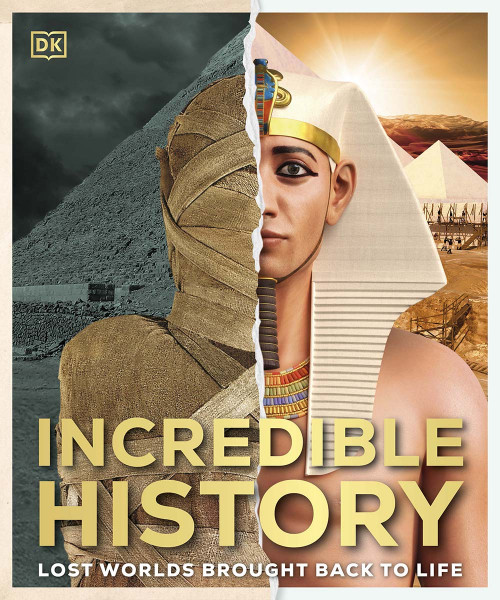-

Ebook - 2 éve
 E-book "Incredible History: Lost Worlds Brought Back to Life" by Dorling Kindersley.
2022, PDF, 162 pages, 60 МБ
Free download:
https://wz.d-ld.net/1566d1b244
Incredible History turns back time to reveal realistic reconstructions of the most incredible locations and exciting moments in history. You'll feel the roar of the crowd at the ancient Olympic Games, walk the ramparts of the Great Wall of China and sail on the Titanic.
Each story begins with an archaeological site. You'll learn when and how it was discovered, and what it teaches us about how the people who lived at the site might have spent their days. Then, you'll see the location recreated in jaw-dropping 3D detail. Using archaeological evidence, the people and places of the past will be brought back to life before your very eyes.
With each page packed with fantastic facts and extraordinary pictures, Incredible History brings together the best bits of history and archaeology, to recreate the entire history of the world.
E-book "Incredible History: Lost Worlds Brought Back to Life" by Dorling Kindersley.
2022, PDF, 162 pages, 60 МБ
Free download:
https://wz.d-ld.net/1566d1b244
Incredible History turns back time to reveal realistic reconstructions of the most incredible locations and exciting moments in history. You'll feel the roar of the crowd at the ancient Olympic Games, walk the ramparts of the Great Wall of China and sail on the Titanic.
Each story begins with an archaeological site. You'll learn when and how it was discovered, and what it teaches us about how the people who lived at the site might have spent their days. Then, you'll see the location recreated in jaw-dropping 3D detail. Using archaeological evidence, the people and places of the past will be brought back to life before your very eyes.
With each page packed with fantastic facts and extraordinary pictures, Incredible History brings together the best bits of history and archaeology, to recreate the entire history of the world.
-

Ebook - 2 éve
GLOSSARY Allies People or countries working together. In World War I and World War II, the Allies were the countries fighting Germany and other forces. Ammunition Objects fired or propelled from a weapon, such as bullets. Amulet A small object believed to ward off evil spirits, illness, or danger. Anglo-Saxon The people who lived in England from the 5th century, and ruled large parts of it until the Norman conquest in 1066. Ancestor A person who lived in the past, and who is a distant relative of people who are alive today. Aqueduct A special channel (either raised up or buried underground) that carries water. Archaeologist A person who excavates sites to reveal their history, by studying the objects and human remains found there. Artefact An object made by someone, such as a beautiful vase, or a useful pot or tool. Artillery Large guns used in warfare. Artisan A skilled craftsperson producing things by hand. Autopsy Examination of a dead body performed by a trained pathologist, to find out how the person might have died. Bacteria Tiny microscopic life forms that live all around us; some can cause disease and infections. BCE A term meaning "Before the Common Era", placed after a date to indicate it happened before year 0, which is the start of the "Common Era", or CE. Bullion A bar of precious metal, such as silver or gold. Calligraphy Handwriting as a highly valued art form, especially in Arabic, Chinese, and Japanese script. Caravan A train of animals, usually camels, used to transport goods across long distances. Camel caravans were often used on the Silk Roads. Cast A copy of an original artefact, made by pouring plaster into a mould. In archaeology, plaster is poured into holes formed in the earth when bodies and artefacts buried there have decayed. CE Abbreviation for "Common Era", used in dates (see BCE). Citizen A person who belongs to a city or a bigger community, such a state or country, and has certain rights. City-state A city, and its surrounding territory, that has its own independent government. Civil war A war fought between inhabitants of the same country. Colony An area under the political and economic control of another state, usually in a foreign country. Culture The customs, beliefs, and behaviour shared by a society. Deity A god or a goddess. Diplomat A person appointed by a country or other political body to carry out negotiations and maintain relationships with other countries. Dogfight A close battle between two fighter planes, especially in World War I and II. Dynasty A family ruling a country for successive generations. Emperor/Empress The absolute ruler of an empire. Empire A group of lands or peoples under the rule of a single government or person. Excavate In archaeology, to dig up an area in an organized way in order to find remains of buildings, people, and artefacts. Excavation An area being dug up for archaeological purposes. Extinct Describes a species that has no living members. Fortification A strong building or set of buildings, designed to withstand attacks and protect the people inside it. Forensic Describes work carried out by scientists to help solve crimes. Fresco Art painted directly on a wet plaster wall. Frieze A decorative carving running along the upper part of the wall of a building. Galleon A type of three-masted ship used in the 15th-17th centuries. Glacier A large, slow-moving mass of ice on land, often through a mountain valley. Government A group of people governing a country, often (but not always) elected to do so. Gothic A style of architecture popular in medieval Europe from the 12th century, featuring soaring spires and pointy arches. Also refers to the religious art of that period. HQ (Headquarters) In World War I, the place where military commanders stayed, planned, and oversaw the operations on the battlefield. Immigrant A person leaving one nation to move to another country and settle there. Import The purchase of goods and services from other countries. Infantry Neolithic Province Siege A part of an army made up The later Stone Age, during A part of a country, or empire, The surrounding and blockading of soldiers fighting on foot. Kingdom A state or area ruled over which improved stone weapons were made and the first farming began. which often has the right to rule itself to some degree. Quarry (blocking entrances and exits) of a castle, town, or other fortified structure in order to capture it. by a king or queen. Noble A member of the nobility or A place where rocks and minerals are dug or hacked Silk roads Several trade routes from China Loincloth A piece of fabric or animal skin aristocracy, with more rights and privileges than people who were out from the ground. to West Asia and Europe, named after the most valuable product tied around the hips. peasants or merchants. Ranch A large farm where horses, traded, silk. Mangrove Palaestra sheep, or cattle are bred, Slavery A tree that grows in shallow water and on low shores by the sea or in river estuaries in tropical regions, with roots A school for wrestling in ancient Greece and Rome. Pavilion especially in the Americas. Sacred Considered holy, and with The system of owning people as property. Enslaved people have no rights and work with no pay. growing above ground. Manuscript A small building, often made to be decorative rather than just practical, and with a roof resting religious significance, possibly related to a god or goddess. Smelting A process used to extract metals from rocks, known as A document written by hand, the common form of book before on pillars instead of walls. Sanctuary A holy or sacred place, such as ore, containing them. printing was invented. Peasant A worker on the land, usually a temple or church. Also a place where people could seek shelter Society A group of people who live Medieval Describes anything dating from or taking place during an agricultural labourer. Petroglyph and protection. Scripture together or who are involved together in a community. the 6th to the 15th centuries, A carving or painting made Sacred writings of any religion, State especially in Europe. on a rock. such as the Christian Bible. A country, or region within a country, which has its own Merchant A person who buys or Pharaoh A title given to a king in Scythian A person from Scythia, an government sells goods. Mosaic A decoration made from small pieces of glass, stone, or ancient Egypt. People believed that pharaohs had sacred powers and were descended from the Sun god, Ra. historic region on the grasslands north of ancient Persia. Sentry A soldier who is on guard Sultan Title of a ruler of some Muslim countries or regions. Temple tile stuck into position to make a picture or pattern. Pictogram See Petroglyph or watch duty. Settlers A building for religious worship or ceremonies. Mughals Pilgrim People from a region or country Territory The Muslim people who A religious person who makes who move into another region A geographic area that has ruled large parts of India from 1526 to the mid-19th century. Mummification The process of preserving a dead body to prevent it from decaying. Mummification can also occur naturally when bodies are exposed to certain conditions. a journey to a holy place. Pilgrimage A religious journey to a holy place. Plantation A farm or estate on which cotton, tobacco, coffee, rice, hops, or other crops are grown. or country that is new to them, often on land already settled by an indigenous population. Settlement A place where people have settled down and built homes. Shrine A building or place considered sacred and usually dedicated to a god, spirit, or holy object. come under the control of a government.
Legutóbbi bejegyzések
- Országos vastagbélszűrési program
Plaintext | 25 | 2 napja
- Budapest100 és programjai
Plaintext | 48 | 5 napja
- Közvetlen eszmecserébe jutni a tudományos tájékozódást igénylőkkel
Plaintext | 116 | 2 hete
- Nemzetközi jelentőségű feltárásokat végez a Hadtörténeti Intézet és Múzeum Baján
Plaintext | 227 | 3 hete
- A Max Space szeretne a Föld pályájára „stadion méretű” élőhelyeket bocsátani egy SpaceX fedélzetén
Plaintext | 136 | 3 hete
- A Samsung 2024-ben visszaszerezte a világ legkelendőbb okostelefon-gyártója címét
Plaintext | 164 | 1 hónapja
- Volt alelnöke nem támogatja Trump újraválasztását
Plaintext | 261 | 1 hónapja
- Megnyílik Európa leghosszabb hyperloop központja
Plaintext | 347 | 1 hónapja
- Notepad++ portable 8.6.5 released
Plaintext | 172 | 1 hónapja
- Digitális–kvantum hibrid szuperszámítógépek
Plaintext | 168 | 1 hónapja
- Művészcsere program kortárs művészek, kutatók és kurátorok számára
Plaintext | 199 | 1 hónapja
- Becoming by Michelle Obama Free Download
Plaintext | 0.9K | 1 hónapja
- Sikeres lesz a magyar uniós elnökség
Plaintext | 421 | 2 hónapja
- A rendkívüli lakásbiztosítási időszak
Plaintext | 188 | 2 hónapja
- Az Egyesült Királyságban űrtechnológiai startup mesterséges intelligencia műholdat indított el
Plaintext | 502 | 2 hónapja
- Divas jazz anthology sheet music
Plaintext | 194 | 2 hónapja
- Magyar légierő pilótái és műszaki szakemberei jelentős fizetésemelést kaptak
Plaintext | 326 | 2 hónapja
- 15 milliárdos szakaszra pályázhatnak a cégek munkahelyi képzéseik megvalósításához
Plaintext | 639 | 2 hónapja
- Watercolor Workshop II - Simple Steps to by Barnes-Mellish and Glynis
Plaintext | 317 | 2 hónapja
- Kötelező lesz a Magyar Postával szállítania minden webshopnak
Plaintext | 238 | 2 hónapja